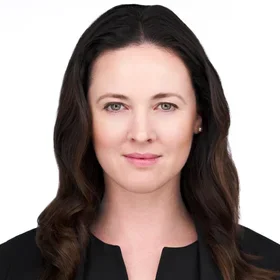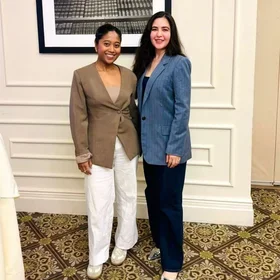Nathaniel Hill ('16SPS, Advanced Graduate Certificate in Business) grew up in New Hampshire and cherished every visit his family made to Broadway. Today, he is the founder and president of Broadway Plus, a startup that tailors backstage VIP theater experiences to those looking to get the most out of their visit to the theater district with great seats, and actor-led backstage tour and a swag bag. He first came up with the idea while working on a class assignment as part of the Advanced Graduate Business Certificate at the Columbia University School of Professional Studies.
Before coming to Columbia in 2015, Nathaniel had been working for producers and general managers on Broadway. While in undergrad at Duke, he interned with Stone Productions, and became Baseline Theatrical’s first associate after he graduated college. Now, that production company is known for managing Hamilton around the world.
We caught up with Nathaniel to find out what brought him to SPS and how he came up with the idea for Broadway Plus:
What drew you to the business program?
I thought about getting an MBA (my dad has an MBA), but in the theater business it is not advantageous at all to stop working. I was interested in learning more about business, but I knew I didn’t want a degree that meant I would be recruited by a corporation. Also, I didn’t really want to go back to school for several years. A friend of mine told me about Columbia’s Business Certificate program and that you could do it at night. I didn’t have an idea yet for a business, but I knew I might one day and wanted to be prepared for that.
When did you attend and what courses did you take?
I started the program in 2015 and finished in 2016. I took financial accounting (which I would say has saved me thousands of dollars to this day), negotiation, marketing strategy, and developing and implementing new ideas (which I called ‘entrepreneurship’).
I spend $500 a year on bookkeeping for what other people might spend $5,000 ... that’s because of the accounting classes I took at Columbia.
Nathaniel Hill, '16SPS, Advanced Graduate Certificate in Business
Can you give me an example of how what you learned in class has come up in your business?
The economics of my business are relatively simple, so I worked with a theatrical bookkeeper to set it up, but I do the day-to-day financials. I spend $500 a year on bookkeeping for what other people might spend $5,000...that’s because of the accounting classes I took at Columbia. I like it because I see and keep track of every dollar that comes in and out of the business.
Tell me a little bit about the “Developing and Implementing New Ideas” class with John Bockstoce.
I remember that John was super enthusiastic and we did a lot of Harvard Business School Case Studies, which I loved. And then we had to come up with an idea for a business to pitch, which would be our final project. I remember he gave us that assignment and then I was going to a show that weekend and I was like “Oh, I should make a travel agency for Broadway shows.”
That was the first idea because my grandmother used to go on theater trips to London, where you see five shows in three days, or something crazy like that. That was more of a thing in London than here. I researched it and found that there are travel agencies for New York, but none specifically for Broadway experiences.
So, I was happy no one was doing that yet. I brought that idea to John and because he is a luxury hotel consultant, he knew a lot about the space. He really pushed me to refine my focus on what did not exist and what I uniquely could add to the space. That was when I came up with the idea more specifically to offer meet-and-greets and concierge service. That has existed with concerts for more than 20 years. That became the Broadway Plus niche.
I remember John really pushed me to answer: “What is my unfair advantage?” as it pertains to entrepreneurship. That is, what can I do, that most people can’t?
I spent a year talking to every producer I knew in the industry to find out what my unfair advantage would be, and to understand how I should structure my business. It’s a difficult structure to figure out because shows don’t sell their own tickets -- the theater has their own ticketing system that they are bound to. It is very complicated how the money flows in and out. That was the hardest thing I had to develop, the financial backend.
We had to come up with an idea for a business to pitch. I was going to a show that weekend and I was like “Oh, I should make a travel agency out of going to see Broadway shows.” ... [The professor] really pushed me to refine my focus on what did not exist and what I uniquely could add to the space.
Nathaniel Hill, '16SPS, Advanced Graduate Certificate in Business
What have been the biggest lessons you’ve learned along the way of making the business?
I remember that one of the lessons in John’s class was about how you should consider Plan B, C, or D -- not just Plan A. My Plan A is still a part of my business, but it is only one component of my business. I’m flexible and I don’t want to miss opportunities. I provide a lot of different services.
How has the business grown?
I’ve taken on one strategic minority partner in the business. My background is in theater and his experiences is in VIP experiences for music and sports. I have one full time employee in addition to myself. Hopefully more to be added.
What has surprised you about this experience?
What makes it interesting for me is this whole startup culture. I don’t really consider myself a startup. I think this is a young, small business. Nowadays, everyone asks “What is your app?” You have to automate everything. It’s all about scale. But what I do is the opposite because when people spend thousands of dollars on an experience, they don’t want a robot, they want to talk to a real person who cares about them and is there to make sure they have a great time. My business is actually more about the human touch than I was led to believe the future of business would be. Having someone personally care about you is a luxury now.
How do you make partnerships with shows?
I’m lucky to be in the position of trying to make everyone more money. Trying to make the show more money, the actors who do the backstage experiences more money -- so that is a good pitch. But it can be a long process because there are a lot of stakeholders who need to approve, and it’s a very political business.
What advice do you have for students in the Business Certificate program or who have a kernel of an idea but not the full business plan?
Take the project seriously. If you are excited about your idea, it is worth it to find the people who are doing that kind of work and interview them about what you need to know.
While you’re a student, it is a lot easier to get meetings with people in your field. Use your status as a student and take advantage. People higher up are more willing to talk to you.
What’s next for you?
I grew the business a lot after the first two years. I’m no longer concerned the business will work out. I got past the three year hump! Now I’m trying to delegate more day-to-day operations so that I can focus on long-term growth prospects.
I also produced a show a year ago called “Cleopatra,” a dance party experience show. I’m trying to bring that one to Vegas and London. We also have an album on Spotify.
Learn more about the Advanced Graduate Certificate in Business at Columbia University School of Professional Studies.


